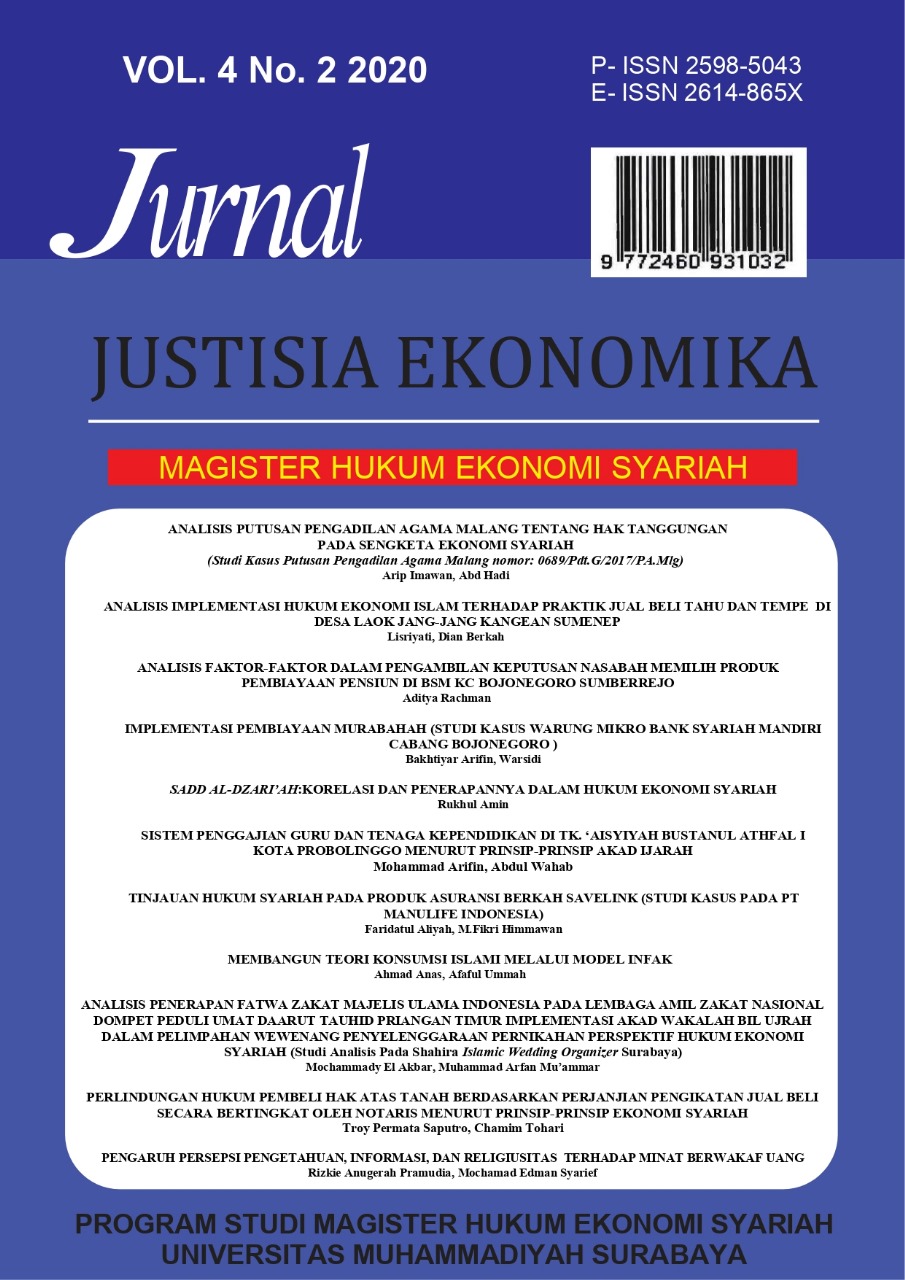MEMBANGUN TEORI KONSUMSI ISLAMI MELALUI MODEL INFAK
DOI:
https://doi.org/10.30651/justeko.v4i2.6879Abstract
This study was based on the assumption that Islamic concumption theory which exists
today is result from combination between conventional concumption theory and Islamic
religion theory. Conventional concumption theory has many limitations and incompatibility
with Islamic teachings and ethics concumption. This study aims to build Islamic concumption
theory through infak model. Infak model which is not only materialist, but shar'i, spiritualist,
socialist, fair, moral and ethical is believed to be very compatible with the characteristics of
Muslim consumers. This study is a type of library study that requires philosophical and
theoretical studies that have to do with empirical facts. Results of study showed that Infak of
consumption is an activity to spend wealth in an effort to fulfil the needs for the benefit of the
world and the hereafter. In infak of concumption activities, consumers must pay attention to
limitations that cover two important components, namely Islamic law and ethics. Then infak
model explains the level of priority that is the theory of consumer decision making in
spending wealth. Furthermore, the purpose of consumption in infak of consumption includes
two components; material satisfaction and prosperity in hereafter. Both components are
contained in a term called "maslahah".
References
An-NabhÄnÄ«, T. (2004). NiẓÄm Al-Iqtiá¹£ÄdÄ« FÄ«l IslÄm. Darul Ummah.
An-Nawawi, S. (1929). Sharkh An-NawawÄ« AlÄ á¹¢ahÄ«h Muslim.
Ar-RÄzÄ«, F. (1981). MafÄtih Al-Ghayb. Dar Alfikr.
At-TabarÄ«, I. A. -J. (2001). JÄmi’ Al-BayÄni FÄ« Ta’wÄ«l Al-Qur’īni. Hajr.
At-Tirmidhī,Muhammad Bin Isa. (2011). Sunan At-Tirmidhī. Dar Ibnu Jauzi.
Az-ZabÄ«dÄ«, M. (N. D. ). TÄj Al-‘ArÅ«s ‘An JawÄhir Al-QÄmÅ«sÄ«.
Daud,Sulaiman Abi. (2009). Sunan Abi Daud. Pdf. Dar Risalah Alamiyah.
Hans, P. S. S. D. W. D. N. (1993). Ekonomi. Erlangga.
Kahf, M. (2012). Infak In The Islamic Economic System Monzer Kahf Infak In The Islamic
Economic System.
Karim, A. (2012). Sejarah Pemikiran Islam (9th Ed. ). Pt Rajagrafindo Persada.
Khaf, M. (1995). Ekonomi Islam: Telaah Analitik Terhadap Fungsi Sistem Ekonomi Islam.
Pustaka Pelajar.
Khan, F. (2013). An Alternative Approach To Analysis Of ConsumerBehaviour : Need For
Distinctive Islamic Theory. Journal Of Islamic Business And Management, 3(2), 15–49.
Manan, M. A. (1997). Ekonomi Islam: Teori Dan Praktik. PT Dana Bhakti Prima Yasa.
Mankiw, N. G. (2003). Teori Makro Ekonomi. Erlangga.
Muhadjir, N. (1996). Metodologi Penelitian Kualitatif.
Muhammed,Mustafa Omar. (2011). Economic Consumption Model Revisited: Infak Based
On Al- Shaybani’s Levels Of Al-Kasb. IIUM Journal Of Economics And Management.
Rahim, H. A. , & Bahari, Z. (2018). Keynes’ Consumption Theory: A Reevaluation
According To The Islamic Perspective. Global Journal Al-Thaqafah, 8(1), 7–13.
Salleh, M. S. (2011). Islamic Economics Revisited : Re-Contemplating Unresolved Structure
And Assumptions. 8th International Conference On Islamic Economics And Finance.
Doha, Qatar.
YÅ«suf Al-Qará¸ÄwÄ«. (1995). Dawrul Qiyam Wal AhklÄq FÄ«l Iqtiá¹£Äd Al-IslÄmÄ«, NiẓÄm Al￾Iqtiá¹£ÄdÄ« FÄ«l IslÄm (1st Ed. ). Maktabah Wahbah.
Downloads
Published
How to Cite
Issue
Section
License
HAK CIPTA
Penulis yang mengirimkan artikel dalam jurnal Justisia Ekonomika harus memahami dan menyetujui persyaratan tentang hak cipta jurnal Justisia Ekonomika sebagai berikut:
1. Hak Cipta tulisan / artikel yang diterbitkan di jurnal Justisia Ekonomika otomatis menjadi hak pengelola jurnal atau publisher
2. Meskipun Hak Cipta atas tulisan yang telah diterbitkan di jurnal Justisia Ekonomika adalah menjadi haknya publisher, tetapi penulis masih mempunyai hak untuk : a). Penulis boleh meng-upload di repository kampus, b). Penulis boleh meng-upload di webnya sendiri, c). Penulis boleh meng-upload di google schoolar, orchid dan sinta
LISENSI
Lisensi atas tulisan / artikel yang diterbitkan di jurnal Justisia Ekonomika adalah menggunakan Creative Commons dengan atribusi CC-BY-NC 4.0






















